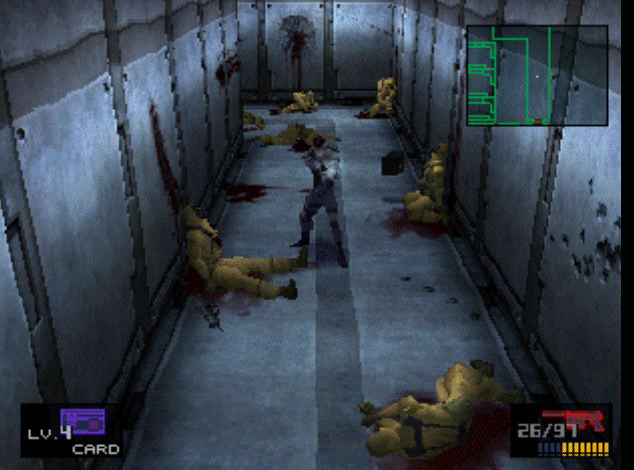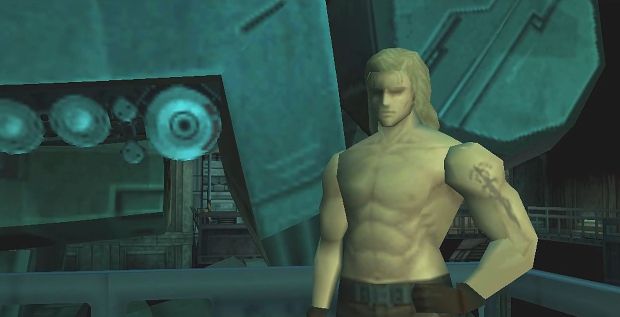Spoilers, Beware! Read Part 2 Before This!
Furthermore, since the game begins as a relatively straightforward spy-thriller, you honestly imagine that you’ve got a grip on the universe. The undercurrent of realism lasts until Psycho Mantis pops in to say hello and all hell breaks loose. By introducing weird elements like this in the plot, Metal Gear Solid further tries to keep the player off balance. The rules of this fictional universe just aren’t clear, which means that anything could happen. Not even Solid Snake knows exactly what’s happening until the very end, when nothing’s quite as it seems and the twists just pile onto you.

The ambience of Shadow Moses probably adds a lot to this, too. If you’re not in combat or a populated area, the ambient sounds try to keep you on edge like Resident Evil more than a spy game. Seriously, the whole island, for whatever reason, sounds incredibly spooky and strange. All this creepiness just builds and builds, and I found it quite unsettling. It’s nothing less than disorienting and disconcerting at times when it plays communication to the player and the seemingly inconsistent story elements with complete seriousness, even in 2014. Many times, it does feel like the game speaks directly to you, and literally no other game series does this in quite the same manner. Physical exertion outside of the game (such as Meryl’s codec number) make you a part of the story as much as Snake – there’s a strange connection developing between you and him.
That connection primarily comes through the plot, but Kojima makes sure we know one thing: somebody controls us, and we can do nothing about it. Remember when Naomi Hunter prevents Solid Snake from using weapons in the Nuclear Storage Facility due to nanonmachines? That’s exactly how the game functions most of the time: controlling your whims. Our natural inclinations mean we will ignore manipulation and betrayal from our superiors, and our baser instincts will take over. In the case of video games, we’ll enjoy violent content to which we disagree simply because we enjoy it; we’ll give it a handwave and move on, even though we’d never do that in real life. Or would we?
Characters comment on Snake’s love of violence, but they also mention you. Do you really enjoy conflict? Can you not live without it? Does it make it difficult to form human relationships? Heck, video game are still subcultural, and that strange violence fetish means we won’t suddenly cross to the mainstream anytime soon. That constant presence of Kojima speaking through his characters to you, the player, shines as something quite unique even now. It certainly does it as effectively, if not more so, than Spec Ops: The Line, and it came out fifteen years before that game!
Heck, the scene where they make it explicit takes place in first person, further reinforcing the direct communication between game character and player. Of course, we must admit that if Snake does not fulfill his mission objectives, the world will be thrown into nuclear chaos or worse. Things never seem quite that clear cut! As the bosses die, their expansive dialogues blur the lines between friend and foe, and make your motivations all the more blurry. Is Snake just like them? Are you just like them?

Even so, the game retains a sense of humor both effective and absurd; it is, in effect, one of the first self-aware games, and that sort of writing doesn’t just come out of the blue. It subtly subverts action game tropes while reveling in them at the same time. Kojima seems to love campy action movies, all said, and that love comes through on two or three levels.
One should note the constant theme of “fate”. Are people determined to do things by their past, or can they forge their own future? Does one’s genetic code place us down a path that we cannot control? Does nature’s DNA force us into certain actions without us knowing it? I’m pretty sure “gene” is the primary theme of this game. If not, then can human being forge their own path into the future? Kojima paints in shades of gray, never providing strict answers and always making Solid Snake into a self-deprecating hero who rejects glory even as he revels in conflict.
And you wondered why we’re playing a stealth action game, right? That’s because shooting people would allow you the illusion of control over your own fate and destiny. Stealth places you in a more passive role over the proceedings, watching and waiting for your next move. The level design determines when you move, how you move, and where you go. Why didn’t the US Government bother to give you more weapons when you started the mission, and why don’t you question it at all? Metal Gear Solid wants you to know that video games deceive you into accepting values and ideas unknowingly. Sure, it’s all in good fun and for the purpose of entertainment, but Hideo Kojima forces you to think about these things.
Kojima mostly presents such questions of fate and control through both narrative and mechanics, rather than answer anything definitively. Cut through the reams of exposition, though, and he presents a simple answer: just live. These are questions of which we cannot know the answers. From my perspective, only God knows whether our paths lead towards a specific end of His choosing, or whether God allows human beings free will. Human beings, however, will always try to know and, further, to control their own destinies.
